Rachel Mennies: Interrogating Our Animalness
If you know Rachel Mennies, you don't need me to tell you she's a triple threat of smarts, talent, and generosity. If you don't know her, have a seat, dear reader, and prepare to hand over your heart, silver platter and all. There's perhaps nothing more rewarding than listening to a poet discuss something they deeply love, and for Rachel, that's her dog Otto. She talks about how he came into her life, both the subtle and dynamic ways he's shifted her worldview, his steady presence in and around her poems, and how animals help us understand ourselves.
Before we get to it, a little about Rachel: She's the author of The Glad Hand of God Points Backwards (Texas Tech University Press, 2014), winner of the Walt McDonald First-Book Prize in Poetry, and the chapbook No Silence in the Fields (Blue Hour Press, 2012). Her poems have appeared in Hayden’s Ferry Review, Poet Lore, Indiana Review, Black Warrior Review, and other literary journals. She is the series editor (2015-) for the Walt McDonald First-Book Prize at Texas Tech University Press, she teaches in the First-Year Writing Program at Carnegie Mellon University, and she is a member of the editorial staff at AGNI. She lives in Pittsburgh with her dear pup Otto.
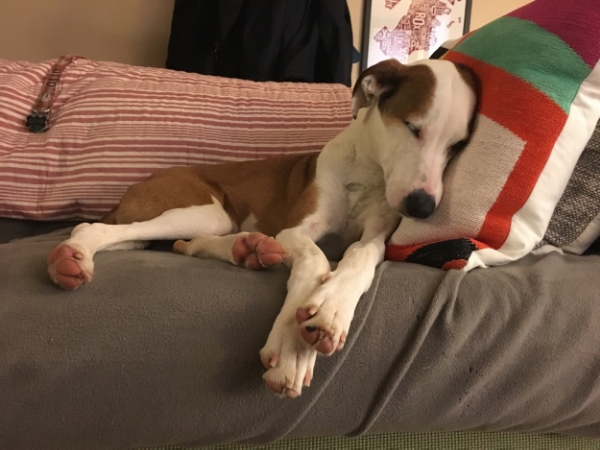
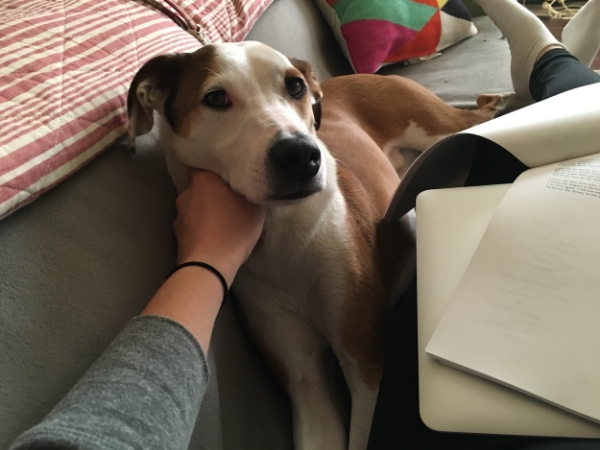
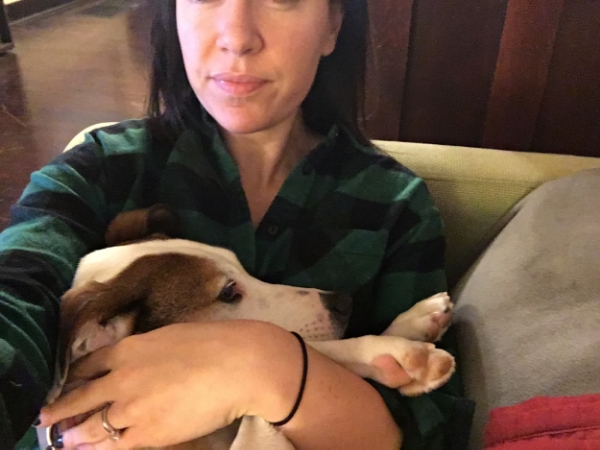
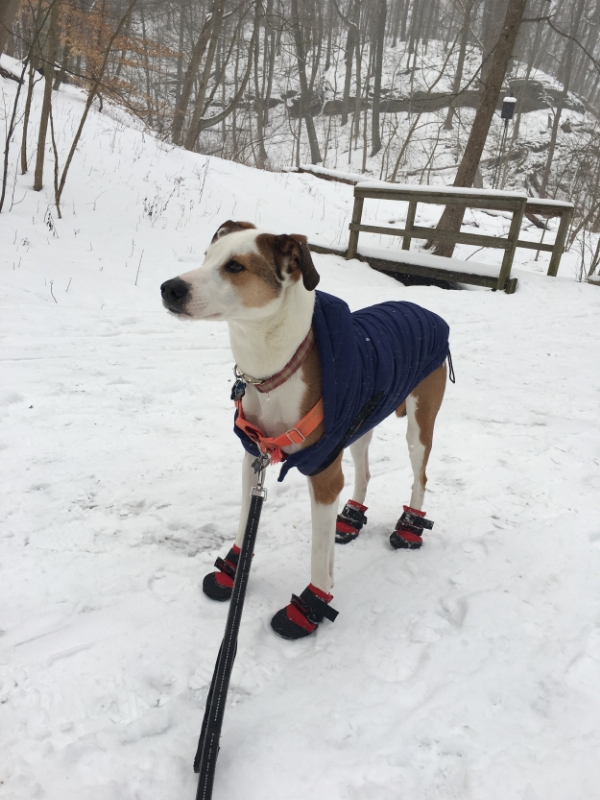
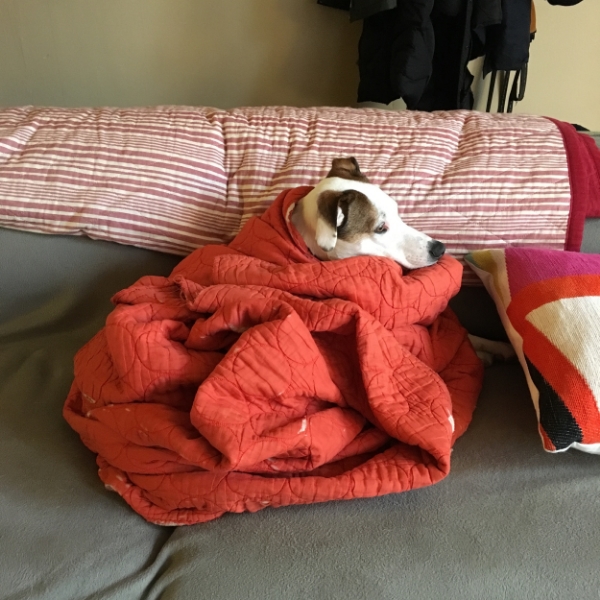
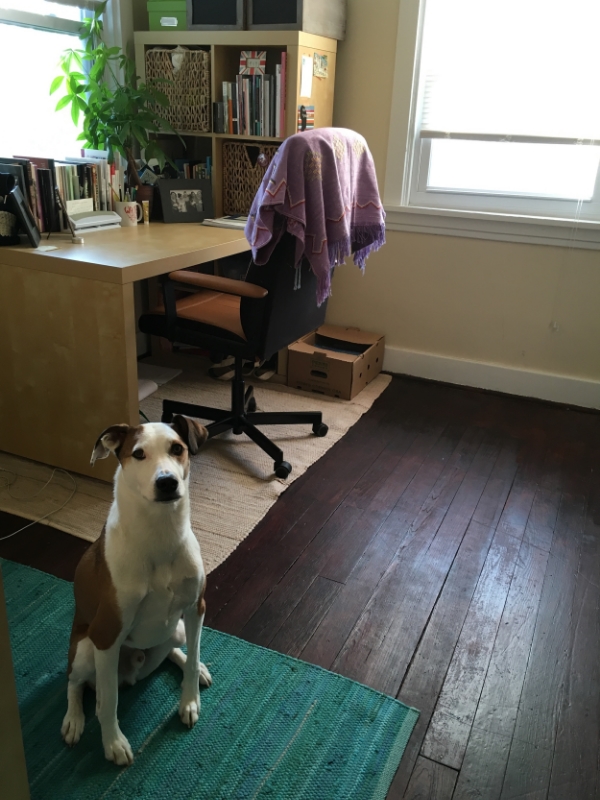

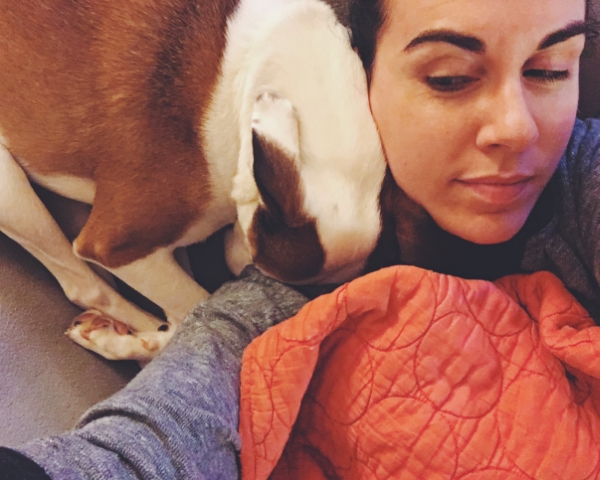
How did Otto come into your life?
About three years ago, my husband and I decided to tackle the responsibility of dog ownership, after wanting a dog for many years prior. Moving from that general decision to the specific decision of which dog to adopt—we went the rescue route—was the hardest part of the process. The days spent on Petfinder meant reading one heart-tugging story after another, especially knowing we could only take on one dog and, since we have an apartment with no yard, had to choose a dog carefully that could handle our city-living situation. After all the reading, we went to exactly one shelter and Otto, an Italian greyhound-beagle-other mix who was about four months old at the time, was the second dog we walked. We brought him home the next day.
Did you grow up with pets or was getting a dog a brave new world for you?
My parents got our first dachshund, Maddie, when I was a senior in high school, so I spent most of my time at home without a dog in the house. They now have two sibling dachshunds—Sammie is from the same parents, but a different litter than Maddie—and Otto plays with them as much as Maddie and Sam will allow it when I come home to visit. Because Maddie arrived right as I was preparing to leave home, I participated very little in her dog-care routine—Otto’s mostly “brave new world” territory for me.
“We’re both habit-seekers, and we’ve learned each other’s routines quite well at this point.”
Tell me a story that gives a good snapshot of your relationship with Otto.
As Otto’s gotten older—he’s three now, so no longer a puppy—he sleeps for longer and longer into the day, while I’m a true morning person. He usually pads into my “office,” the room in our apartment that holds my desk and yoga mat and the best natural light (and a plant, if I’ve managed not to kill it), an hour or so past once I’ve made coffee and begun to work, and he sets his head on my knee to let me know he’d like to go outside. We’re both habit-seekers, and we’ve learned each other’s routines quite well at this point.
You mention how Otto's schedule helps keep your writing life structured in your blog post "Poetry on The Animal Calendar" for the Tahoma Literary Review. (Oh, how we live and die by the dog schedule in my house.) I'm fascinated by this very practical and direct way he's influenced your writing process. Other than the built-in time blocking (bonafide productivity hack: get a dog!), are there other ways Otto's presence has helped you write poems?
I think often about the depth of affection a human earns from a dog once the relationship’s had some time to grow: Otto seeks my presence and time and touch so much in exchange for what to me seems like very little (food, water, shelter, predictable and consistent kindness). The bond helps me write because it exists dependably and without question—often the opposite of how I feel in terms of the writing process.
Otto and I had to earn this slowly in each other, which may also be familiar to other rescue-dog owners. The first month we adopted Otto, which also happened to be the first month of my fall semester, he growled at us from under our couch (thankfully, he’s outgrown being able to fit under there…), destroyed a few of our belongings, pulled hard away from me on his leash, and fought to get out of his crate daily. He almost escaped from our car at the animal shelter. He had no idea who we were, where he’d gone, or why we’d brought him to us. I thought for the first month that I couldn’t handle dog ownership.
But the semester continued, and he calmed down, and I found that he became the calmest when I sat beside him on the couch, each of us on a separate cushion, and I took out my computer and wrote (or graded papers). With time, he eased closer; now, if I write on the couch, he stretches out long between my legs and the couch’s back, burrowed in as close as possible. If I snap the laptop closed, he thinks it’s time for a walk. His calmness and affection feel sanctioning, especially in the many moments that I find the writing process difficult or anxiety producing. Sometimes I read drafts aloud to him, which is a comfort, too.
“The bond helps me write because it exists dependably and without question—often the opposite of how I feel in terms of the writing process.”
We've got to talk about "Elegy with Attack Dog," a poem I will remember as long as I'm on this green earth, especially the closing lines: "And you lie awake / and stare at the loss, rubbing / the soft spot at your throat / that misses the shape / of its mouth." I love the metaphor of the dog to illustrate the mechanics of grief. Can you talk a little about the inspiration behind that?
A couple of summers ago, two friends of ours had taken their own two dogs out for a run when a neighborhood dog broke from his yard and attacked all four of them. It’s a long and sad story, but at the end of it, only one of their dogs survived, and Animal Control eventually euthanized the “attack dog.”
As a dog lover, stories like these—in which the creature we love, that we let sleep in our beds and eat from our tables, bares its teeth and reminds us of its power to destroy—are especially difficult to process. In the specific grief I felt for my friends, I began thinking about the fear the incident left behind in me (that whole summer, each dog that ran up to Otto at the park or on the street made my pulse elevate) as a metaphor for a broader sense of loss—how long it takes, if ever, to pass through the process of grief into permanent safety or calm.
I moved practically from these thoughts into a draft of “Elegy…” in a writing workshop I was spying on that was led by the poet Jill Khoury—we were teaching in a Young Writers program together at the time—who had tasked the high-schoolers with writing a poem that utilized anaphora. I started with the specifics I remembered of my friends’ attack—the dog going for their dog’s neck, and holding on—and the poem unfolded slowly from there.
Let's talk about the non-metaphorical dogs and animals that show up in your poems. Why do you think animals have such a prominent place in poetry at large and in yours in particular?
I write often about the human body and its animal-feeling; I wonder if some of our writing about animals comes partially from our desire to interrogate our own animal-ness. To that end, I’m often struck by the strangeness of living with a domesticated animal, but an animal nonetheless—how at times I can see Otto give into what we might call his “animal nature,” despite his training and domestication. A couple of months ago, Otto (somehow) grabbed a live bird out of the air in his teeth and only let go once I pried open his jaw. He’d just spent the morning sleeping beside my desk, docile, but right in front of me—and in a split second—he’d killed a bird. In moments like this one I’m reminded of my own human-animal modulations between desire, restraint, action.
Otto also makes his way into my poems because of our proximity—I see his face and body in each of the rooms of our apartment, in the park across the street, in the backseat of my car. I probably spend more time with him than any other living creature, so it makes sense that he appears in my poems, too.
“I wonder if some of our writing about animals comes partially from our desire to interrogate our own animal-ness.”
Your favorite poem about an animal or with an animal in it?
Paisley Rekdal’s “Why Some Girls Love Horses” and much of Robin Becker’s poetry, as animals (especially dogs) figure prominently throughout her work. She’s written two of my all-time favorite poems specifically about rescue dogs: “Rescue Parable” and “Rescue Riddle.” The lines “When she takes her morning tea, he settles / beside her – body of law and praise, / procuress, his winter and summer hearth” make me think of the routine I have earned with Otto.
Has caring for an animal helped shape how you see the world around you? If so, how?
Entirely, and that surprised me. My husband and I don’t have children, so we often hear from others that Otto is our child—a joke I’ve made a few times myself, too. Before we adopted Otto, I always rolled my eyes at people who referred to their dogs as their children, and I still find the comparison tenuous as I watch some of my friends become parents, but where I do see similarity (I imagine) is the way that keeping any sort of creature alive puts you on a spectrum of tested patience and earned love. I have agreed to care for Otto as long as he is mine; there is no opting-out or break-taking, because forgetting him would harm him. Even if he destroys something (his most recent chew-obsession, horribly, has been books!) or disobeys me, there is still no opting-out. There is more work to do to keep him behaved, perhaps, or longer walks that must be taken, but there is no backing away from the caretaking altogether.
I look at other dog owners in the park with an understanding that I didn’t possess before Otto’s adoption: what I’m understanding is what it feels like to have offered yourself up to an animal, knowing both the vastness of the work and the even more vastness of the reward, the love.
“What I’m understanding is what it feels like to have offered yourself up to an animal, knowing both the vastness of the work and the even more vastness of the reward, the love.”
Writing can put me in a weird headspace, but I've found that my dogs help pull me back to the surface afterward. Can you relate?
Absolutely, yes. Otto has become a reminder to me of how to access simple joys when my writing has cost me them, and a signal back to participation in the daily life I’ve “left” while writing—I have to walk the dog, have to feed the dog, have to hug the dog.
A simile for Otto?
Otto is like a tiny missile (but one that gives you kisses instead of blowing you up at the end?). He’s focused and incredibly fast and target-obsessed (very greyhound), and once he’s spent all his energy and reaches his destination, usually the couch, he’s warm and immediately inert.





